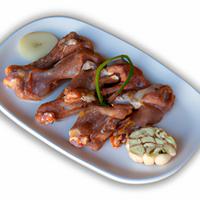
1 serving (100 grams) contains 253 calories, 17.6 grams of protein, 20.8 grams of fat, and 0.0 grams of carbohydrates.

Log this food in SnapCalorie

Nutrition Information
Calories |
602.4 | ||
|---|---|---|---|
% Daily Value* |
|||
| Total Fat | 49.5 g | 63% | |
| Saturated Fat | 13.8 g | 69% | |
| Polyunsaturated Fat | 0 g | ||
| Cholesterol | 200 mg | 66% | |
| Sodium | 195.2 mg | 8% | |
| Total Carbohydrates | 0 g | 0% | |
| Dietary Fiber | 0 g | 0% | |
| Sugars | 0 g | ||
| protein | 41.9 g | 83% | |
| Vitamin D | 0 mcg | 0% | |
| Calcium | 26.2 mg | 2% | |
| Iron | 3.1 mg | 17% | |
| Potassium | 357.1 mg | 7% | |
* Percent Daily Values are based on a 2,000 calorie diet. Your daily values may be higher or lower depending on your calorie needs.
Food Attributes
Source of Calories
About Chicken neck
Chicken neck is a flavorful poultry cut, commonly used in soups, broths, and stews across various cuisines, particularly in Asian, Middle Eastern, and Eastern European dishes. Rich in connective tissue and collagen, it is often simmered to create nutrient-dense stocks that support joint health and skin elasticity. Chicken neck is high in protein but typically contains more fat than lean cuts of chicken, making moderation important for those monitoring calorie or cholesterol intake. It also provides essential minerals like phosphorus and selenium, which are beneficial for bone health and the immune system. While chicken neck is less meaty than other parts, its combination of tender meat and cartilage is prized for its texture and ability to enhance the depth of flavor in dishes. Proper preparation ensures its health benefits while balancing its fatty content, making it a versatile addition to wholesome cooking.



